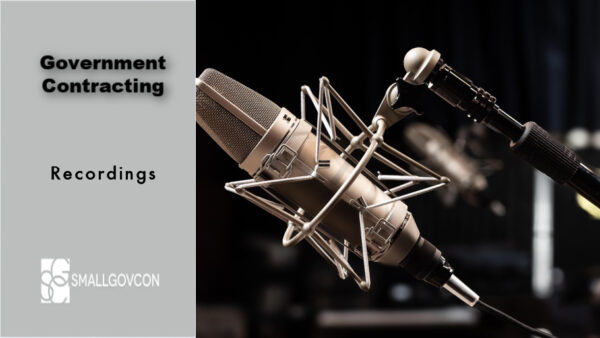We have talked a good deal about the Small Business Rule of Two (not to be confused with the separate VA rule of two for veteran-owned businesses) over the years. The (very) general gist of the rule is this: If the procurement is above the simplified acquisition threshold, the agency must set it aside for small businesses if two or more small businesses can perform the work at fair prices. If the agency has a reasonable expectation that two or more SDVOSB/VOSBs, EDWOSBs/WOSBs, 8(a) participants, or HUBZone participants can perform work under a procurement, the agency must consider setting aside the procurement for that particular category (i.e., if it believes two or more 8(a) participants can perform the work, it can set aside the procurement for 8(a) participants). However, it appears there remains a good deal of confusion about what the Rule of Two requires, as opposed to what it simply permits. In a recent GAO protest, a contractor learned this the hard way, and today, we’ll explore that decision.
Continue reading…FAR 2.0 Update: Part 8 – Required Sources of Supplies and Services
Many federal contractors have heard about the revamping of the Federal Acquisition Regulation. Variously called FAR 2.0, the Revolutionary FAR Overhaul, or simply RFO, this project has been undertaken by the Office of Federal Procurement Policy (OFPP) and the Federal Acquisition Regulatory Council (FAR Council). An executive order got the ball rolling, setting forth the mandate to create FAR 2.0 by October 12, 2025. We wrote about it in our earlier post, and described it as two parallel tracks. Track 1 involves a rewrite into “plain language” and removing non-statutory and unnecessary content. Track 2 involves the development of the non-mandatory guidelines to guide procurement officials.
Our earlier posts regarding the RFO can be found here: Executive Order, Overview of FAR 2.0, FAR Part 6.
The revision of the FAR sections has continued over the past few months, with additional proposed revisions being released in September 2025. In this post, we’ll review one proposed revision that seems to make some significant changes to the language: Part 8 – Required Sources of Supplies and Services.
Continue reading…SmallGovCon Week in Review: September 8-12, 2025

This week’s Week in Review includes quite a few updates from the federal procurement world. Federal contractors should take note of several major updates. These include:
- A new GSA streamlining office
- DoD finalized CMMC rules
- Increased federal IT spending overall
You can read more about these topics and more in the articles below.
Continue reading…FAR 2.0 Update: Part 6 – Competition
Many federal contractors have heard about the revamping of the Federal Acquisition Regulation. Variously called FAR 2.0, the Revolutionary FAR Overhaul, or simply RFO, this project has been undertaken by the Office of Federal Procurement Policy (OFPP) and the Federal Acquisition Regulatory Council (FAR Council). An executive order got the ball rolling, setting forth the mandate to create FAR 2.0 by October 12, 2025. We wrote about it in our earlier post, and described it as two parallel tracks. Track 1 involves a rewrite into “plain language” and removing non-statutory and unnecessary content. Track 2 involves the development of the non-mandatory guidelines to guide procurement officials.
The revision of the FAR sections has continued over the past few months, with the most recent proposed revisions being released on September 4, 2025. In this post, we’ll review a proposed revision that seems to make some significant changes to the language: Part 6 – Competition Requirements.
Continue reading…SmallGovCon Week in Review: September 1-5, 2025

Happy Friday and happy September! We hope you had a great Labor Day weekend. It’s that time of year when everything starts to shift. The chill in the air and the marketing of pumpkin spice fills your social media feeds. My kids are back in school and football is back in session as well. Hope you had a great first week of September.
Speaking of shifting, federal government contracting news included a fall target for FAR updates, potential changes to SBIR rules, as well as the unwanted specter of a government shutdown.
Continue reading…Why File: An Appeal of SBA’s 8(a) Program Denial

The U.S. Small Business Administration’s (SBA) 8(a) Business Development Program (the 8(a) Program) is a popular set-aside program that provides a lot of opportunities for small businesses. In hopes of becoming one of those successful businesses, it is common for a company to invest a lot of time, money, and resources into their 8(a) Program application. When SBA denies their 8(a) application, a company may feel like it was all a waste and accept the loss. Focusing only on the denial alone, the company fails to review SBA’s reason for denial. And what if SBA’s reason was wrong? Well, this post explores the option to challenge a denial of an 8(a) application.
Continue reading…SmallGovCon Attorney-Author Stephanie Ellis Discusses Small Business Contracting goals on “The Federal Drive”

I recently had the opportunity to discuss small business contracting goals with Terry Gerton, host of “The Federal Drive with Terry Gerton.” This was a follow-up to a post I wrote in July regarding the changing landscape of federal small business government contracting requirements. That post, published earlier in 2025, focused on the changes to small business federal government contracting goals that had been affected by EO 14151.
Continue reading…